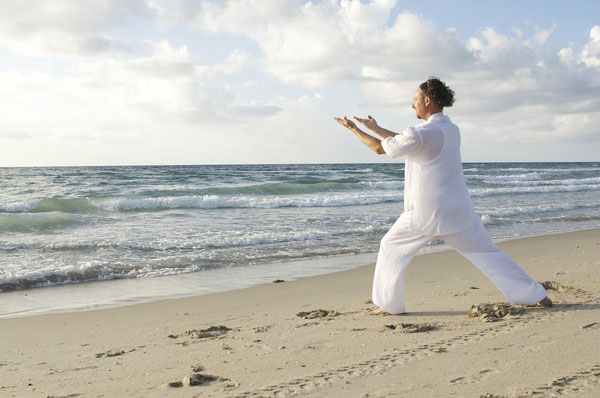“It is over 5 years since I took your class, and it, and your teaching, changed my life. You helped launch me on a healing path toward self-compassion, and I’m so grateful. It made an enormous difference in my life, so much so that I am considering a career shift myself to help others on their healing journeys.”
– Sarah, Mindful Self-Compassion Student
Class Descriptions
Each course curriculum is backed by evidence-based research and the science of neuroplasticity. Classes are taught through a trauma-sensitive lens, enabling all students to experience the transformative benefits of mindfulness in a safe and supportive environment.
Mindfulness
Mark Williams, professor of clinical psychology at the Oxford Mindfulness Centre, defines Mindfulness as “Non-judgmental awareness. A direct knowing of what is going on inside and outside of ourselves, moment by moment.” Simply put, it is paying attention with acceptance.
 Blair teaches Mindfulness to various audiences including women, men, young adults and teens. Class content includes an introduction to mindfulness (what all the fuss is about), its research and benefits, and the basic forms of mindfulness meditation so audience members can determine which approach suits them best.
Blair teaches Mindfulness to various audiences including women, men, young adults and teens. Class content includes an introduction to mindfulness (what all the fuss is about), its research and benefits, and the basic forms of mindfulness meditation so audience members can determine which approach suits them best.
Mindfulness classes are one hour long and you’ll be meditating (promise!) after the first session. 2 classes is plenty to get you started, with perhaps a tune-up or check-in class as follow-up. Class duration may also be customized to suit the needs of your group. Blair is also trained in trauma-sensitive mindfulness so can teach through this lens as the situation requires.
Contact us to schedule a Mindfulness class or private session, or for information on hiring Blair to speak to your group or organization.
Read about the benefits of mindfulness in the Scientific American article, “What Does Mindfulness Meditation Do to Your Brain?”
Mindful Self-Compassion (MSC)
Mindful Self-Compassion is the first step in emotional healing – being able to befriend oneself, turn inward and acknowledge our difficult thoughts and feelings with a spirit of openness, curiosity and love, rather than self-judgment or self-criticism.
MSC improves one’s relationship with oneself and others, enabling us to show up in the world in a more authentic and powerful way. It increases one’s resilience, strength and the capacity within ourselves to face frustration, fear, anxiety or overwhelm with kindness and self-love instead of criticism.
Mindful Self-Compassion can be learned by anyone. The MSC course is an empirically-supported 8-week training program developed by Drs. Kristin Neff of the University of Texas, Austin, and Chris Germer of Harvard Medical School.
Blair has trained directly with the founders of MSC and the focus of her classes is about coping and surviving in a busy and chaotic world. In Blair’s MSC classes, participants learn the power of Mindful Self-Compassion through meditation, experiential exercises, short presentations, group discussion, home practices and more.
Contact us to schedule a private MSC class for your group or organization.
Self-Compassion for Children and Caregivers (SCCC)
“The Self-Compassion for Children and Caregivers program is a powerful way to help kids learn how to be kind to themselves. It takes the core of the Mindful Self-compassion for adults and transforms it into something that is fun and accessible to children and their caregivers.
I’d highly recommend SCCC for anyone who wants their child to grow up with skills of emotional resilience and self-acceptance.” -Kristin Neff, PhD, Co-developer of the adult Mindful Self-Compassion training
Teen & Young Adult MSC
The MSC program for emerging adults is called, “Making Friends with Yourself: A Mindful Self-Compassion Program for Teens and Young Adults.” Making Friends with Yourself (MFY) is an empirically-supported 8-week program designed to cultivate the skill of self-compassion in high school and college-aged kids.
 MFY teaches core principles and practices that enable teens to respond to the challenges of these critical years with kindness and self-compassion.
MFY teaches core principles and practices that enable teens to respond to the challenges of these critical years with kindness and self-compassion.
Adolescence is a time of change and growth. It is the period of life reserved for rebellion and self-discovery, but as the demands in life increase for teens, this time is often fraught with confusion, anxiety or depression. For many teens these challenges lead to disconnection, isolation, and even self-harm.
The MFY Course is designed to facilitate awareness, self-kindness and understanding of our common humanity in response to these growing challenges. Through developmentally appropriate activities and carefully crafted practices and meditations, teens have an opportunity to learn how to navigate the emotional ups and downs of life with greater ease. The MFY course creates an opportunity for adolescents to contrast a healthier worldview and gives rise to greater compassion and empathy toward self and others.
In a preliminary research study, the MFY course demonstrated a significant decrease in depression, anxiety, perceived stress and negative mood with teens and young adults. The curriculum was adapted from the adult Mindful Self-Compassion program created by Drs. Kristin Neff and Chris Germer, and has been endorsed by the founders.
Link to research studies on Self-Compassion and Youth »
Contact Blair to schedule a Teen & Young Adult MSC program for your group or organization.
Shame Resilience
Brené Brown’s 12-session Psychoeducational Shame Resilience Curriculum is called “Connections.”
 Dr. Brown developed this curriculum after publishing her first book on shame resilience. It addresses what important experiences, emotions and qualities are missing when we don’t understand shame or don’t develop shame resilience.
Dr. Brown developed this curriculum after publishing her first book on shame resilience. It addresses what important experiences, emotions and qualities are missing when we don’t understand shame or don’t develop shame resilience.
She explores how our lives change when we stop living in shame, fear and disconnection, and start living with courage, compassion, and connection. What emerged from a great deal of research was the idea that our deepest search is for a life lived with 3 elements: 1) authenticity 2) love and belonging and 3) a resilient spirit.
Blair studied Shame Resilience with Brené Brown, just as Brown’s TED Talk on vulnerability and shame rocketed her into the mainstream. Blair teaches Shame Resilience as a faculty member of Recovery Café’s School of Recovery, and also to individuals, groups and organizations.
Contact Blair to schedule a public or private class on Shame Resilience for yourself or your group.
Mindfulness for Newbies
Mindfulness for Newbies is a customized class (or private session) for those new to the practice of mindfulness. Class content includes an exploration of meditation, breathwork, body scans, loving-kindness (metta meditation), “Effortless Mind” or “Choice-less” meditation, and moving meditation (Qigong). Blair will also delve into the beauty of silence and the many gifts it offers. Each class is tailored to the needs of the specific individual or group.
Meditation has many scientifically proven benefits, including stress reduction, positive brain changes, improved health and increased happiness. Read more in the Psychology Today article, “20 Scientific Reasons to Start Meditating Today.”
You can then apply these advanced tools of mindfulness and meditation to benefit not just yourself, but your relationships, career, community and the world at large.
Contact Blair to schedule a public or private class on Mindfulness for yourself or your group.
Qigong
 Qigong is a moving meditation, a sacred physical art along the lines of Tai chi. It is profoundly healing and particularly good for people who have a hard time sitting still to meditate.
Qigong is a moving meditation, a sacred physical art along the lines of Tai chi. It is profoundly healing and particularly good for people who have a hard time sitting still to meditate.
Qigong has been practiced in China for over 5,000 years and is shown to be effective in addressing and preventing many diseases. Blair has studied and practiced medical qigong for 12 years with Master Chunyi Lin. She has also done a weeklong intensive in Supreme Science Qigong with Jeff Primack.
This ancient discipline combines mental concentration, breathing techniques and body movements to balance, activate and cultivate our vital energy (or “qi”) as it flows through our body. It is both energizing and calming, and amazingly easy to learn.
Contact Blair to schedule a private or public Qigong class for yourself or your group.
Read more in the Wall Street Journal article, “The Intriguing Health Benefits of Qigong.”
The Science of Happiness (or The Art of Developing a Beautiful Mind)
Did you know the United Nations actually proclaimed March 20th an “International Day of Happiness?” Happiness is indeed worthy of its own day.
Research shows happy people are healthier, more likely to have fulfilling relationships, make more money, and are more productive at work. Fortunately, research also suggests happiness is something we can cultivate with practice. More: The Science of Happiness Process & Keys to Well-Being
Contact us to learn how you can integrate The Science of Happiness into your personal life or your organization.